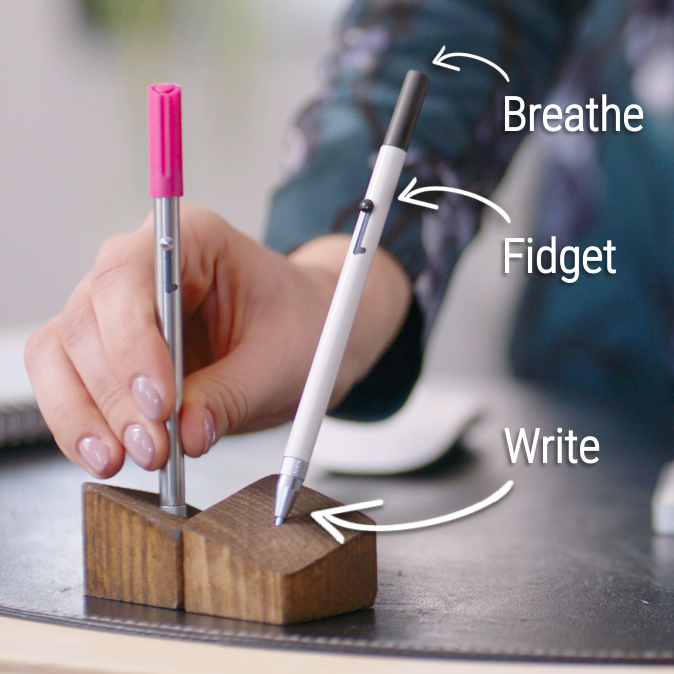Aligning with Purdue’s incentive to support mental health in our community, Dr. Milton Aguirre, an assistant professor in the School of Engineering Technology, has been awarded a $300,000 grant from the National Institutes of Health (NIH) and Indiana’s Applied Research Institute for a device he invented to disrupt anxiety.

The multi-functional device, called the Breathing Pen, pairs stress notification and regulated breathing functionalities with the real-world utility of a writing pen. The device is a simple and discreet “everyday carry” item that employs familiar stress-induced behaviors, like pen-clicking and pen-biting, to train the mind to recognize the first symptoms of stress and condition the body to transition into slow-paced breathing exercises.
Aguirre says the device’s key function is to disrupt the fight or flight response in real-world situations before a sense of panic ensues. He was inspired to create the device after facing his own anxiety and stress during his academic career.
“Yoga and meditation have the intention of slowing down your breathing, so I made a tool that helps people instantly slow down their breathing but also taps into real-world behaviors like fidgeting,” Aguirre said. “It is designed to fit into the fabric of users’ lives to help users build a better relationship with their breathing, our natural self-coping mechanism.”
Aguirre believes the Breathing Pen could help raise awareness of the early stages of stress, give users a way to take action to disrupt the process, and help users feel confident about practicing breathing exercises wherever and whenever needed.
The NIH Small Business Technology Transfer (STTR) grant helps entrepreneurial-minded faculty, like Aguirre, translate academic research into real-world solutions, such as developing research studies with human subjects, testing feasibility and implementation, and preparing for more extensive clinical trials. In the next phase of the project, he plans to partner with Purdue Polytechnic’s Smart Learning Factory to give engineering technology students a hands-on opportunity to learn more about prototyping, machinery, and manufacturing at scale.
Aguirre completed his postdoctoral work in the Netherlands, where he started designing and testing the device. Since joining Purdue three years ago, he says he has been astounded by the university’s openness to collaboration across disciplines, as this project has received support from counseling education and psychology departments.
Aguirre and his lab are passionate about human-centric product design. His research projects often involve learning from users and translating their needs into accessible solutions they can use and test. He hopes this design philosophy will empower students to discover creative solutions that positively impact society.
More information about the breathing pen can be found on the NIH website here.
Additional information

